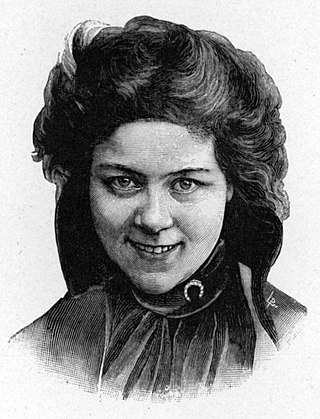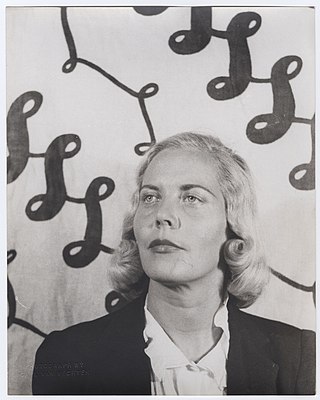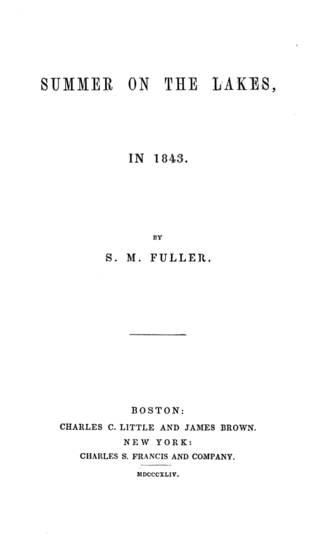Related Research Articles

Richard Buckminster Fuller was an American architect, systems theorist, writer, designer, inventor, philosopher, and futurist. He styled his name as R. Buckminster Fuller in his writings, publishing more than 30 books and coining or popularizing such terms as "Spaceship Earth", "Dymaxion", "ephemeralization", "synergetics", and "tensegrity".

Crystal Catherine Eastman was an American lawyer, antimilitarist, feminist, socialist, and journalist. She is best remembered as a leader in the fight for women's suffrage, as a co-founder and co-editor with her brother Max Eastman of the radical arts and politics magazine The Liberator, co-founder of the Women's International League for Peace and Freedom, and co-founder in 1920 of the American Civil Liberties Union. In 2000 she was inducted into the National Women's Hall of Fame in Seneca Falls, New York.

Sarah Margaret Fuller, sometimes referred to as Margaret Fuller Ossoli, was an American journalist, editor, critic, translator, and women's rights advocate associated with the American transcendentalism movement. She was the first American female war correspondent and full-time book reviewer in journalism. Her book Woman in the Nineteenth Century is considered the first major feminist work in the United States.

Loie Fuller, also known as Louie Fuller and Loïe Fuller, was an American actress and dancer who was a pioneer of both modern dance and theatrical lighting techniques.

Valentina Cortese, sometimes credited as Valentina Cortesa, was an Italian film and theatre actress. In her 50 years spanning career, she appeared in films of Italian and international directors like Michelangelo Antonioni, Federico Fellini, Franco Zeffirelli, François Truffaut, Joseph L. Mankiewicz and others.
Judith Pomarlen Vladeck was a prominent American labor lawyer and civil rights advocate, particularly on behalf of women. She helped set new legal precedents against sex discrimination and age discrimination.
Sherry Beth Ortner is an American cultural anthropologist and has been a Distinguished Professor of Anthropology at UCLA since 2004.

Daniela Gioseffi is a poet, novelist and performer who won the American Book Award in 1990 for Women on War; International Writings from Antiquity to the Present. She has published 16 books of poetry and prose and won a PEN American Center's Short Fiction prize (1995), and The John Ciardi Award for Lifetime Achievement in Poetry (2007).

Marie Marchand, known as Romany Marie, was a Greenwich Village restaurateur who played a key role in bohemianism from the early 1900s through the late 1950s in Manhattan.

Ruth Landes was an American cultural anthropologist best known for studies on the Brazilian religion of Candomblé and her published study on the topic, City of Women (1947). Landes is recognized by some as a pioneer in the study of race and gender relations.
Constance Abernathy was an American architect, jeweler, and associate of Buckminster Fuller.

Katherine 'Kay' Murphy Halle was an American journalist, broadcaster and socialite.

Summer on the Lakes, in 1843 is a nonfiction book by American writer and transcendentalist Margaret Fuller based on her experiences traveling to the Great Lakes region.

Allegra Fuller Snyder was an American dance ethnologist (ethnochoreologist), choreographer, professor, and author specializing in dance and culture. Her research focused on dances among Native American nations, particularly the Yaqui, and on dance among several ethnic groups in Africa and Asia. She was Professor Emerita of dance ethnology from the University of California at Los Angeles (UCLA).

Alisse Waterston is an American professor of anthropology at John Jay College of Criminal Justice, City University of New York. Her work focuses on how systemic violence and inequality influence society.

Gitel (Gertrude) Poznanski Steed was an American cultural anthropologist known for her research in India 1950–52 involving ethnological work in three villages to study the complex detail of their social structure. She supplemented her research with thousands of ethnological photographs of the individuals and groups studied, the quality of which was recognised by Edward Steichen. She experienced chronic illnesses after her return from the field, but nevertheless completed publications and many lectures but did not survive to finish a book The Human Career in Village India which was to integrate and unify her many-sided studies of human character formation in the cultural/historical context of India.

Rita Sapiro Finkler was a Russian Empire-born American physician. She practiced pediatrics and gynecology in her early career, but is best known for her work as an endocrinologist. She established and directed the department of endocrinology at Newark Beth Israel Hospital in Newark, New Jersey.
Sydel Finfer Silverman Wolf was an American anthropologist notable for her work as a researcher, writer, and advocate for the archival preservation of anthropological research. Silverman's early research focused on the study of complex societies and the history of anthropology. This work involved conducting anthropological research in Central Italy, with a focus on traditional agrarian systems, land reform, and festivals in central Italy. She later became active as an administrator, advocating for the study of cultural anthropology and an important force within the community where she organized discussions and symposia around the topic of preserving the anthropological records.
Ruth Adler Schnee was a German-born American textile designer and interior designer based in Michigan. Schnee was best known for her modern prints and abstract-patterns of organic and geometric forms. She opened the Ruth Adler-Schnee Design Studio with her spouse Edward Schnee in Detroit, which operated until 1960. The studio produced textiles and later branched off into Adler-Schnee Associates home decor, interiors, and furniture.
References
- ↑ "Research Guides: Sex Discrimination and Sexual Harassment".
- 1 2 "Valentine Rossilli Winsey". Herald Tribune. February 21, 2007.
- 1 2 Contemporary Authors. Vol. 145. 1994. p. 491.
- ↑ "Valentina Rossilli in the 1940 Census".
- ↑ "Sustaining members of Speech Association of America". Speech Monographs. 13 (2): 1–8. 1946. doi:10.1080/03637754609374907.
- ↑ "Sustaining members of Speech association of America". Speech Monographs. 14 (1–2): 1–9. 1947. doi:10.1080/03637754709374922.
- ↑ Catalog of Copyright Entries: Third series. 1948.
- ↑ "Valentine Diane Rossilli and Coniaio Bufans in a radio booth, March 19, 1948". Newark Public Library Digital Repository.
- ↑ "Valentine Diane Rossilli and Coniaio Bufans in a radio booth, March 19, 1948". Newark Public Library Digital Repository.
- ↑ The Galleon. Seton Hall University. 1954.
- ↑ "Correspondence: Valentine Rossilli, Re: Salary Dispute, 1952 Jan. 30-1953 May 26". Monsignor Noe Field Archives & Special Collections Center.
- 1 2 Debbie Nathan (12 June 2012). Sybil Exposed: The Extraordinary Story Behind the Famous Multiple Personality Case. Simon & Schuster. pp. 163–. ISBN 9781439168288.
- ↑ A Study of the Effect of Transplantation upon Attitudes toward the United States of Southern Italians in New York City as revealed by Survivors of the Mass-Migration, 1887-1915 (Thesis). New York University. 1966.
- 1 2 3 4 "Winsey, Valentine Rossilli". Writers Directory. encyclopedia.com. 2005.
- ↑ Ben Gallob (5 January 1973). "The Jewish Cop: Economics Influenced his Career Decision". The Detroit Jewish News. p. 37.
- ↑ Dennis Hevesi (January 11, 2007). "Judith Vladeck, 83, Who Fought for Women's Rights, Dies". New York Times.
- ↑ "papers of Valentine Rossilli, 1951-1982". Harvard University.
- ↑ "Guide to the R. Buckminster Fuller Papers M1090".
- ↑ Library of Congress Copyright Office (1974). Catalog of Copyright Entries. Third Seies: 1972, January–June. p. 1640.